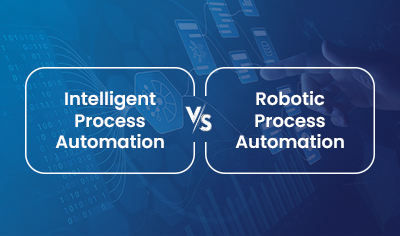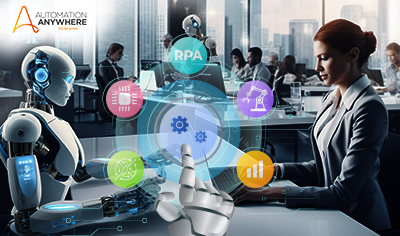Today, technology has become a key enabler for businesses looking to improve their operations. One of the most recent and exciting developments is the rise of agentic automation. This type of automation is different from traditional methods that simply follow specific rules to perform tasks. Agentic automation leverages AI agents (or intelligent systems) to learn and make decisions independently based on real-time data. This means that agentic automation can evolve with changing conditions, improve results over time and eventually handle more complex tasks. Sounds intriguing?
In this detailed piece, we will explore the role of agentic automation, its features, and key components. The post also delves into the use cases, business benefits, challenges, and considerations of agentic automation.

What is Agentic Automation: A Quick Rundown
The term “Agentic Automation” refers to a modern automation approach that uses AI to autonomously perform tasks without requiring human interference. Or, what Mark Benioff, Salesforce’s CEO called it when they launched Agentforce —”digital labor”. It is now safe to say that agentic systems can be relied upon to handle complex processes.
Key Features of Agentic Automation:
- Autonomy: It operates independently, enabling AI systems to implement plans and make decisions without human supervision.
- Flexibility: It can quickly adjust to new situations, allowing for smoother operations.
- Faster Decisions: The AI system analyzes data and makes decisions quickly to keep processes running efficiently.
- Task Management: It can organize and delegate tasks among different AI agents to improve productivity.
- Natural Language Processing: Agentic automation can understand and respond to human language, making interactions much easier.
Basic Components of Agentic Automation:
- AI Agents: These are the core elements that perform tasks and make decisions based on data.
- Data Inputs: Information collected from various sources is analyzed to inform decisions.
- Machine Learning Models: These models help the system learn from experiences and improve over time.
- Integration Tools: These connect agentic automation with other systems and tools used in a business.
Are AI Agents the Future of Automation?
How Businesses Are Using Agentic Automation?
These real-life use cases showcase how agentic automation (or an AI agent) enhances efficiency across industries.
1. Insurance Claims Processing
In the insurance industry, agentic process automation makes claims processing faster from filing to payout without needing human involvement at every step! When someone submits a claim online, let’s say after an accident, the AI agent automatically checks details against policy information before sending it for review by adjusters who only focus on complex cases needing more investigation! This speeds up claim settlements significantly while improving customer satisfaction since clients get timely updates about their claims!
2. Healthcare Management
In healthcare, agentic automation improves patient care by managing appointments and treatment plans better. AI agents analyze patient data and automatically schedule appointments based on availability and urgency. For example, a hospital might use an AI agent to manage its appointment system. This ensures patients are seen quickly while reducing wait times. These AI systems may also monitor patient conditions in real time and alert healthcare providers if any issues come up. This approach allows for timely actions that help save lives. By automating admin tasks, healthcare professionals spend more time providing quality care.
Making Automation a Reality for Connected Healthcare
3. Customer Service Automation
Agentic automation is transforming customer service by using AI agents and virtual assistants. These systems answer customer questions, process orders, and resolve problems without needing human aid. For example, a retail company might use agentic AI to answer common questions about their products or services. This allows customers to get quick answers 24×7, improving their experience. Additionally, these chatbots may look at customer interactions to provide personalized recommendations based on previous purchases. By automating these tasks, businesses reduce operational costs while making sure customers get timely help. This improves customer engagement and allows human agents to focus on more complex issues.
4. Marketing Personalization
Agentic automation is revolutionizing marketing strategies by enabling personalized advertising campaigns based on customer behavior analysis. AI agents may track user interactions on websites and social media to understand customer preferences and interests better. For instance, an online store might use agentic AI to analyze browsing history and recommend products as per individual customers’ tastes. These suggestions increase the chances of conversion by making it easier for customers to find what they want quickly. Furthermore, automated marketing tools can adjust ad placements based on performance metrics. This ensures that marketing efforts are always optimized for maximum effectiveness.
5. Fraud Detection
Agentic automation plays a crucial role in detecting fraud within financial transactions. AI systems monitor transactions in real time to spot unusual activities that may signal fraud. For example, a bank might use an AI agent to analyze how its customers spend money. This lets them flag any unusual transactions for further investigation. If the AI system sees a transaction that seems suspicious — like a big purchase made in another country — it can automatically alert the customer or block the transaction until it is confirmed. This helps protect customers from fraud while allowing banks to respond quickly to threats without requiring constant human oversight.
6. Smart Manufacturing
In manufacturing, AI agentic automation enhances productivity by optimizing production processes and equipment management. AI agents monitor machinery performance and identify potential issues before they lead to breakdowns. For example, a factory might implement agentic AI that analyzes data to predict when machines will require maintenance. This approach helps reduce downtime and ensures that production runs smoothly. Furthermore, agentic AI may also adjust production schedules based on demand data, allowing manufacturers to be more agile to market changes.
7. Energy Management
In the energy sector, agentic AI automation optimizes energy distribution and consumption in smart grids. AI agents analyze data from various sources to balance supply and demand effectively. For example, during peak usage hours, an AI system might automatically adjust energy distribution to prevent outages or overloads on the grid. These systems may also manage renewable energy sources by predicting production levels based on weather conditions and adjusting storage accordingly. By automating these processes, energy companies may improve efficiency while ensuring reliable service for customers.
8. Research Assistance
Agentic automation is also helping researchers with data analysis tasks (yes, you read that right). AI agents can quickly sift through large amounts of research papers or datasets to find relevant information needed for specific projects. For example, academic institutions may use such AI systems when doing literature reviews so scholars save time spent searching manually and can focus more on actual analysis instead. By automating this process, researchers gain insights faster leading to better results overall.
9. Self-Driving Cars
Agentic automation is at the heart of self-driving cars, allowing them to drive safely without human help. These vehicles use AI algorithms to process data from sensors in real time. For example, a self-driving car looks around for obstacles while figuring out the best route based on traffic conditions. This level of automation makes traveling safer by lowering traffic through smart route decisions made by the car’s AI system.
The Ultimate Guide to Next-Gen Automation
Why Should You Consider Agentic Automation?
Listed below are the benefits that companies may harness with agentic automation adoption.
I. Cost Savings
Using agentic automation helps businesses save a lot of money. By automating repetitive tasks, companies rely less on manual labor and more on digital labor. For example, in the customer service domain, agentic automation can handle basic questions through chatbots, allowing human agents to focus on more complicated issues that need personal attention. This saves money and improves efficiency since automated systems can work 24×7. Also, by reducing mistakes from manual processes, businesses may avoid costly errors and improve overall efficiency. The combination of lower labor costs and fewer mistakes makes agentic automation a great choice for companies wanting to use their resources better.
II. Improved Customer Experience
Agentic automation greatly enhances the customer experience by providing faster and more personalized service. For instance, automated systems can look at customer data to offer recommendations based on previous purchases or browsing behavior. When customers need support, chatbots powered by agentic automation can give immediate answers to common questions or problems, significantly reducing wait times. Quick responses make customers feel valued, leading to greater satisfaction and loyalty. Also, by freeing human agents from routine tasks, they can focus on providing more meaningful help to customers who need special assistance. Overall, agentic automation helps create a smooth experience that meets customer expectations well.
III. Scalability
One of the main benefits of agentic automation is its scalability. As businesses grow or face more demand, these systems can easily adapt without needing major changes or extra resources. For example, a company getting many orders during a holiday season can use agentic automation to handle the increased workload efficiently. The system can automatically adjust workflows to manage more tasks without needing extra staff or extensive training for current employees. This flexibility allows businesses to maintain high service levels even during busy times while minimizing disruptions. By using scalable solutions like agentic automation, organizations can grow confidently without being held back by traditional limits.
IV. Enhanced Decision-Making
Agentic automation helps organizations make better decisions by providing real-time data analysis. These systems quickly process large amounts of data to identify patterns that people might miss. For example, an agentic system can analyze market trends and suggest the best strategies based on current data. This ability to make informed decisions quickly allows businesses to respond to changing customer needs. Furthermore, with continuous learning capabilities, agentic systems become better at predicting outcomes over time. This means decisions made with agentic automation are faster and more accurate, leading to an improved bottom line.
V. Better Adaptability with Regular Enhancements
Agentic automation supports ongoing improvement within organizations by analyzing performance data and suggesting improvements. These AI systems learn from past actions and outcomes to refine processes over time continually. For example, if an automated workflow identifies a bottleneck in production, agentic AI can suggest changes or different approaches to improve efficiency. This ongoing feedback encourages organizations to adapt their operations based on real-world performance instead of relying on outdated methods or practices. By promoting a culture of continuous improvement through agentic automation, businesses stay relevant and competitive.
VI. Improved Resource Allocation
With agentic automation handling routine tasks, businesses can use their resources better for strategic tasks that drive growth. Employees are freed from boring work and can focus on core activities. This may include engineering new products or improving customer service. For example, marketing teams can invest more time in creative campaigns instead of handling reporting tasks. This better use of human resources leads to increased job satisfaction among employees. It also contributes positively to overall business performance as teams can focus on what truly matters.
Agentic Automation: Challenges and Considerations You Need to Know Beforehand
Here are a few challenges that companies may face when setting up agentic automation.
Complexity in Implementation
Implementing agentic automation can be quite complicated. Businesses often have existing systems that need to work together with new technologies. This integration can require significant time and resources. Companies might face disruptions during the setup phase, which can affect daily operations. Additionally, training staff to use these new systems adds another layer of complexity. It is essential for organizations to have a clear plan and to start with small projects before scaling up. This approach helps manage the challenges and allows for gradual adaptation to the new technology.
Dependency on Accurate Data
The success of agentic automation hinges on the quality of your data. If the input data is wrong or incomplete, the decisions made by these systems will be inaccurate. Organizations need to ensure they have reliable data sources and good data management practices. This involves cleaning existing data, setting up regular updates, and checking data quality over time.
Maintenance Challenges
Maintaining agentic automation systems can be demanding. After initial setup, ongoing management is necessary to ensure they continue to function effectively as business needs evolve. This includes updating software, troubleshooting issues, and adapting processes as required. Organizations must allocate resources for maintenance tasks and develop strategies to manage changes without disrupting operations.
Summing Up
The rise of agentic automation is changing how we work and live. These smart systems perform tasks on their own, helping businesses become more efficient and productive. By taking over routine jobs, these systems allow humans to focus on more creative work. As we move forward, it is important for organizations to adopt agentic automation thoughtfully. This means planning well, training staff, and monitoring how these systems work. By doing this, businesses may realize the full potential of automation while reducing risks. Ultimately, agentic automation offers great opportunities for growth and innovation. If done correctly, it leads to a future where humans and machines work together smoothly.





